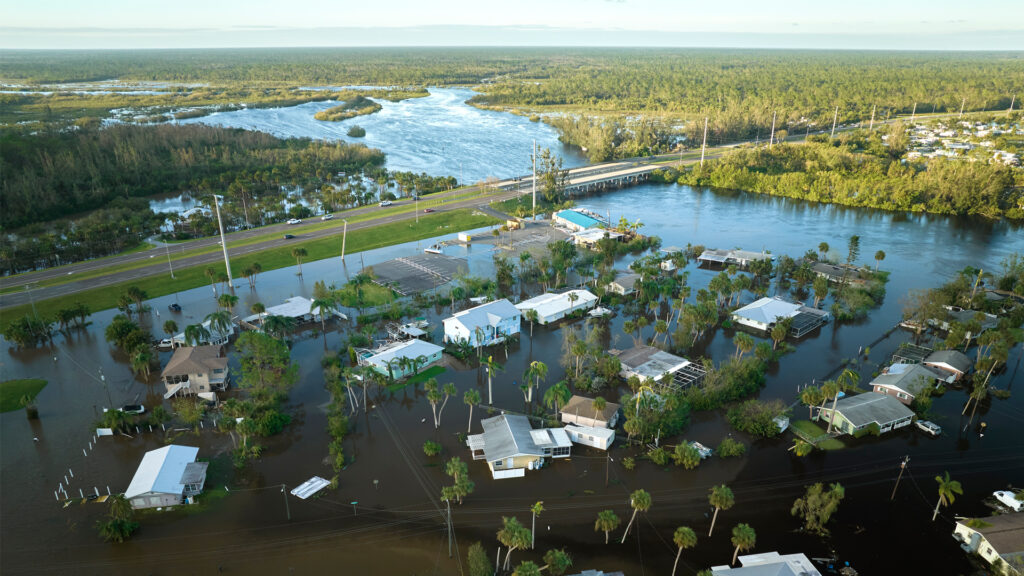By Rachel Rhode and Eve Cooke, Environmental Defense Fund
Buying a home is often one of the biggest financial decisions individuals and families will ever make. More than one-third of Florida properties are at risk of severe flooding in the next 30 years, and despite these risks, Florida does not require flood-related disclosures to prospective homebuyers.
Across the U.S., 32 states have enacted flood disclosure laws, requiring a seller to share a property’s flood risks or past flood damages during real estate transactions. Florida residents deserve transparency through flood disclosure, and Realtors would benefit by keeping up with this growing industry standard.
Knowing one’s risk is essential in ensuring effective preparedness and response. The Federal Emergency Management Agency estimates just one inch of flooding in a typical 2,500 square feet, one-story home can cause more than $25,000 in damages. It is widely misunderstood by more than one-third of homeowners that flood damage is typically not included in standard homeowners or rental insurance policies.

Legislators and Realtors are stepping up to address this gap in Florida’s flood policies. In the 2024 Florida legislative session, there has been bipartisan support for a new policy on flood disclosure. The Florida Realtor Association is among the stakeholders supporting this initiative.
Knowledge is power. Below are the top five reasons why mandatory flood disclosures are a win for Realtors and residents.
1. Meeting consumer expectations and building trust
Homebuyers often lack awareness about flood hazards but still have a strong desire to be informed about different aspects of a property during the home-buying process. A 2023 Fannie Mae study found that 94% of Florida respondents stated that knowing about previous flood events and damages is “critical” or “important” when choosing a new home.
Trust is the bedrock of a Realtor-client relationship. Clear and concise information about the potential risks associated with a property helps Realtors showcase that they are looking out for their clients and have the potential to increase referrals or repeat clients.
2. Lowering of National Flood Insurance Program premiums
Lower National Flood Insurance premiums can positively impact home affordability and increase sales. Incentives through the Community Rating System provide a financial advantage for communities participating in flood risk reduction measures, including mandatory flood disclosure. In response to Miami-Dade County’s efforts to reduce flood risk, the National Flood Insurance Program in January 2024 upgraded the community rating of Miami-Dade County, thereby providing residents with a 35% discount on flood insurance premiums.
FEMA’s new risk-based rates for the National Flood Insurance Program (NFIP) are expected to increase premiums for Florida policyholders by an average of over 230%. For most policyholders, NFIP premiums will increase 18% per year until premium costs reach the full new flood insurance rate.
For instance, yearly NFIP premiums for Collier County homeowners are expected to rise 278%, from $1,053 to $3,536. Discounts on flood insurance may offer a financial nudge that encourages buyers to purchase a home or continue living in Florida.
3. Keeping pace with industry and national standards

Flood disclosure is gradually becoming standard practice in Florida and across the nation. For example, Realtor.com offers a flood risk information tool that allows potential buyers to see the flood risk rating of any property listed on the website. Florida is projected to continue welcoming over 800 new residents daily through 2028 who may bring with them expectations of disclosure they had in another state.
Likewise, some Realtors and local governments within Florida have taken action to ensure residents are aware of a property’s flood risk by creating voluntary forms of flood disclosure such as the Pinellas County Real Estate Flood Disclosure Program. Aligning with evolving norms enhances the credibility of the Florida real estate market, fostering trust among consumers and reinforcing the professionalism of real estate practitioners.
4. Providing legal clarity
Florida home sellers are already required to disclose property-related conditions like radon or lead paint, but the law is unclear on when or how flood risks should be disclosed. This opens the potential for future and costly litigation.
For example, in Newbern v. Mansbach (2001), buyers sued a seller who did not disclose that the property fell within the Coastal Barrier Resource Area (CBRA), making the house ineligible for flood insurance. The trial court dismissed the case, citing the public availability of CBRA information, but the appellate court overturned this decision, ruling in favor of the purchasers.

When flood risks are mandated to be disclosed upfront, it reduces the likelihood of legal issues arising between Realtors, buyers and sellers.
5. Building community resilience
As global weather patterns change, Realtors can play a powerful role in building community resilience by educating buyers about flood risks and encouraging the adoption of resilient practices.
Flood disclosure contributes to the overall awareness of flood-prone areas, fostering a community-wide understanding of the importance of preparedness and support for risk mitigation in the face of evolving challenges. Tackling these challenges head on will strengthen Florida’s real estate market and protect residents in the long term.
Rachel Rhode is a manager and Eve Cooke is a fellow in the Environmental Defense Fund’s climate resilient coasts and watersheds initiative. This piece was originally published at https://blogs.edf.org/growingreturns/2024/02/14/five-reasons-why-mandatory-flood-disclosure-in-florida-would-be-a-big-win-for-realtors/.
If you are interested in submitting an opinion piece to The Invading Sea, email Editor Nathan Crabbe at ncrabbe@fau.edu. Sign up for The Invading Sea newsletter by visiting here.



